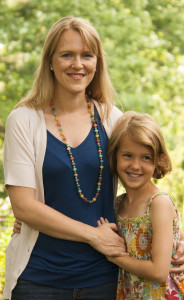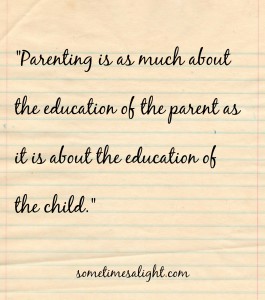The Education of a Parent
 Today my daughter turns 10.
It’s quite a milestone for both of us. For her, it means finally passing into “double digits” –that mysterious world that few of us ever pass out of. For me, it signals a decade of motherhood. When my Phoebe came into the world a little after 3:30 on a rainy South Carolina Thursday, it wasn’t simply the beginning of her life; it was the fundamental altering of mine.
Today my daughter turns 10.
It’s quite a milestone for both of us. For her, it means finally passing into “double digits” –that mysterious world that few of us ever pass out of. For me, it signals a decade of motherhood. When my Phoebe came into the world a little after 3:30 on a rainy South Carolina Thursday, it wasn’t simply the beginning of her life; it was the fundamental altering of mine.
Looking back, I can see how much motherhood has changed me, how much it has forced me to grow beyond myself. I realize now that when folks spoke of me as a “young mother,” they weren’t talking about the age of my daughter so much as about the fact that I was new to the game. I had a lot to learn.
Those first few years were spent learning to make the “right” choices; choices about... feeding and sleeping habits, immunizations, potty training, and pacifiers. And once I’d figured how to actually keep her alive (and not alienate all my friends and family in the process), it was time to learn how to “train her up in the way she should go.” Suddenly the questions were about when to let her to use electronics and where to send her to school.
Ten years later, I’m still not sure of the best way to get toddlers to eat their food; I never really figured out how to potty train in a day, and I’m pretty ambivalent about whether or not kids should watch television when they’re two. But I have learned one thing:
Parenting is as much about the education of the parent as it is about the education the child.
If you talk to seasoned parents, they’re likely to tell you that parenting (like marriage) is one of the hardest things you’ll ever do. Young parents often think that the difficulty lies in finding just the right path, in navigating the narrow way, in discerning between good and evil. To them, the challenge of parenting comes from a lack of knowledge, not from a lack of wisdom. But after ten years, I can tell you that the thing that makes parenting so difficult is realizing how immature you actually are. The hardest thing about parenting is coming face to face with your own weaknesses.
One of the remarkable things about children is that they reflect the nature of the adults around them. It’s like having a 4-ft-tall mirror walking around in front of me. As quickly as I see flaws in my daughter’s life, it’s certain that those same flaws are present in mine. When I point my finger in the mirror, it’s pointing right back at me. So that while books and theories and schooling choices and finding just the right church do shape children’s development, nothing shapes them more than the character of the adults they live with.
- If a parent is undisciplined, all the chore charts in the world won’t teach his child to be disciplined.
- If a father lacks self-control, don’t be surprised when the son throws a temper tantrum.
- If a mother doesn’t speak kindly about the people in her life, her daughter is likely to be the “mean girl” on the playground too.
- And if you are not pursuing God, odds are that your children won’t either.
Once you understand this truth, it’s natural to become discouraged. It’s humbling to realize that your flaws are being exposed. And if you’re like me, you may want to just give up altogether. How can we call our children to maturity when we ourselves are not mature?
But before you throw in the towel, remember this: While nothing shapes our children more than their mother and father, nothing shapes us more than our Heavenly Father. Because as much as we are parents, we are also children. We are children of a perfect Father who is faithfully parenting us. A Father who is kind and generous and just and wise. And just like our children will reflect our character, we are destined to reflect His.
This will happen the same way it happens in our homes. How do our children end up as little carbon copies of us? By spending time with us. By living in the same space we do. By sitting down and rising up and walking and talking with us. So that as you spend time with our Heavenly Father, as you live in His presence, you will become like Him as well.
And as you do, as you grow, your children will grow too. As you model His character, they will model His character because they have seen it in you first. And as His Holy Spirit wells up inside of you as a fountain of life, it will overflow, bringing life to all those around you. So that, in the end, the best way to learn to be a good parent is to learn to be a child who reflects the goodness of our Heavenly Father.
